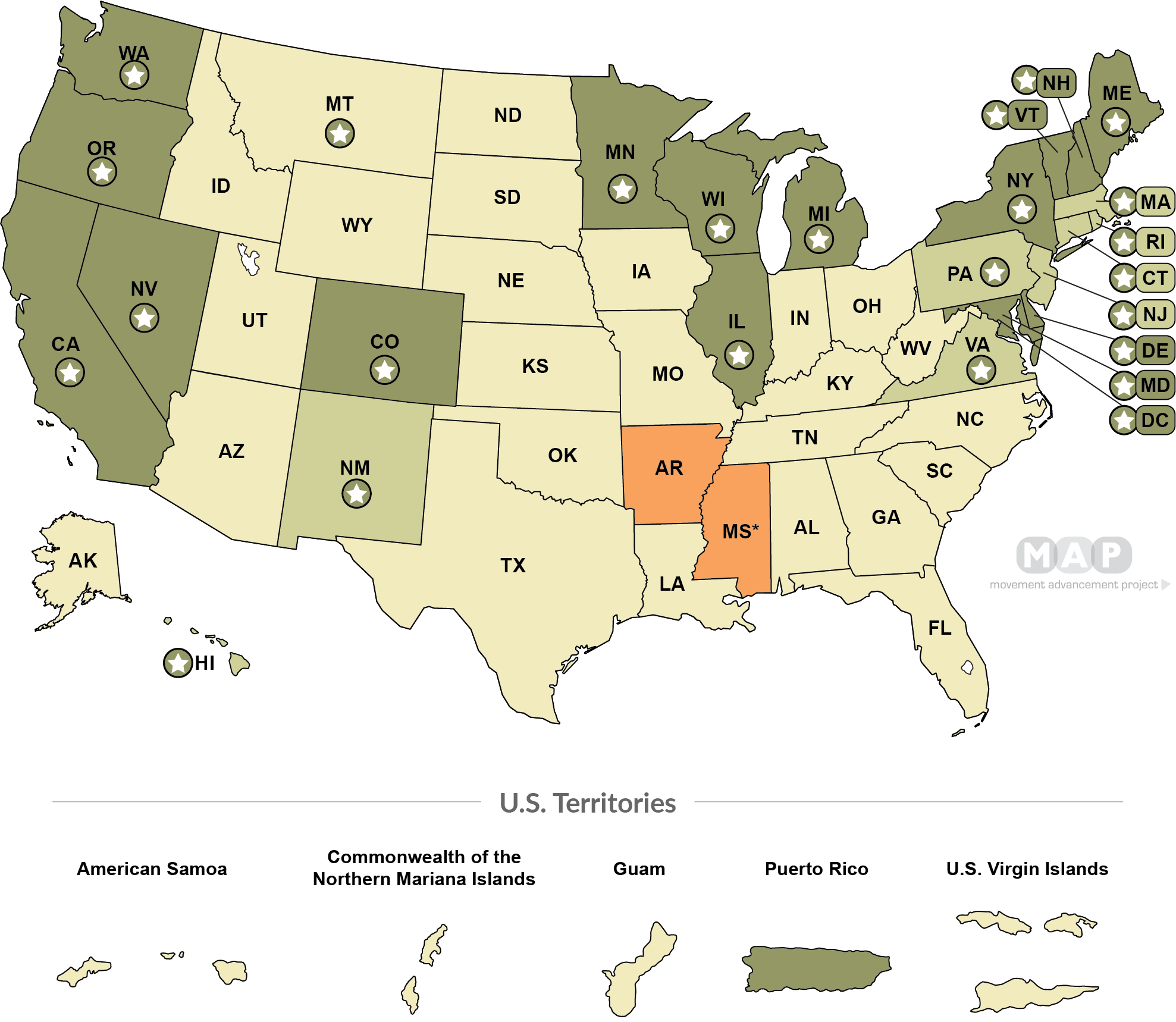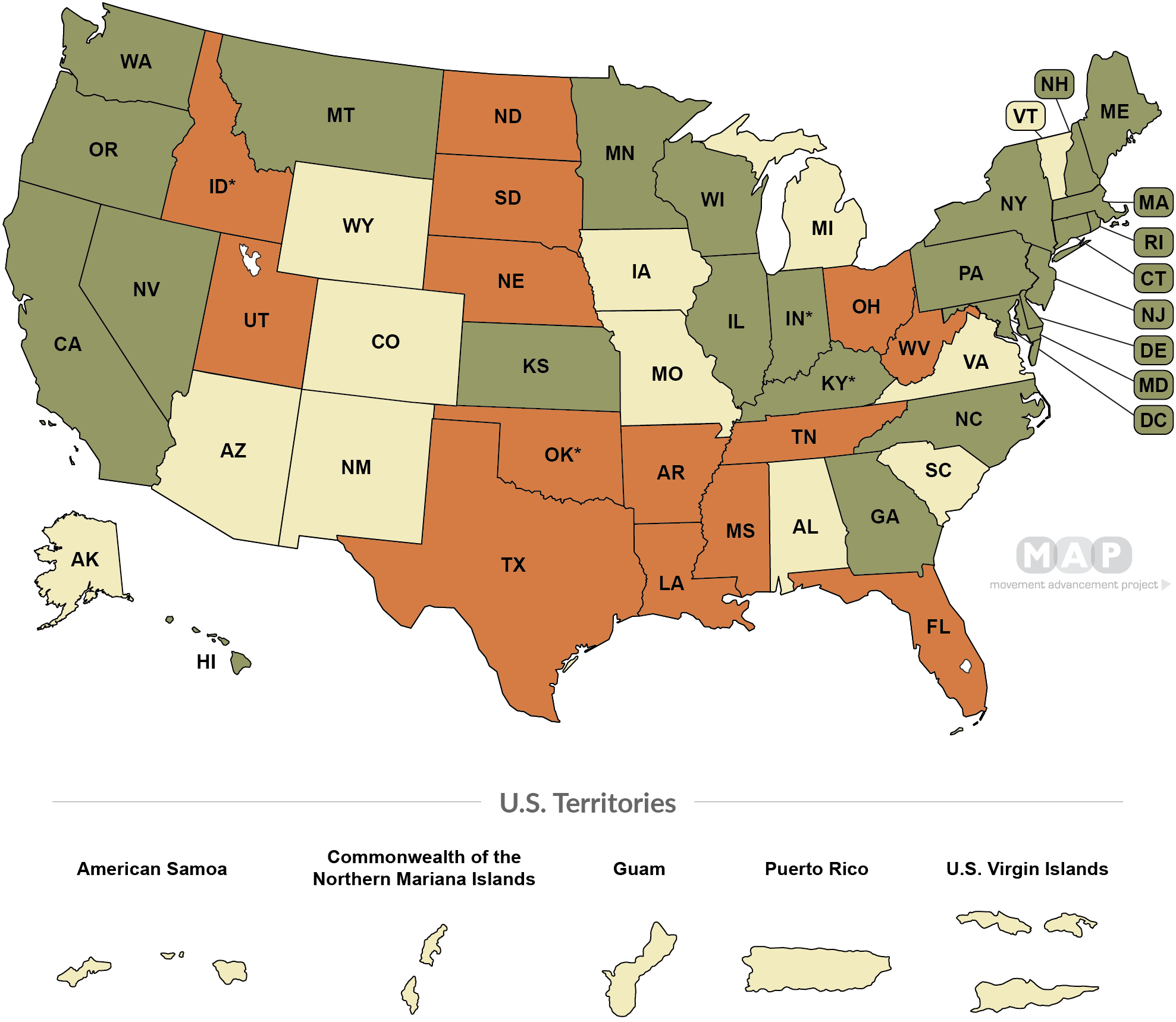
- Transgender exclusions in health insurance service coverage prohibited (24 states + D.C.)
- Law prohibits health insurance discrimination based on sexual orientation and gender identity (15 states , 1 territory + D.C.)
- Law prohibits health insurance discrimination based only on gender identity only (8 states)
- Law prohibits health insurance discrimination based only on sexual orientation only (0 states)
- No law providing LGBTQ inclusive insurance protections (25 states, 4 territories)
- Law explicitly permits insurers to refuse to cover gender-affirming care (2 states)
Recommended citation:
Movement Advancement Project. "Equality Maps: Healthcare Laws and Policies." https://www.lgbtmap.org/equality-maps/healthcare_laws_and_policies. Accessed 04/02/2025.
Percent of Adult LGBTQ Population Covered by Laws
*Note: These percentages reflect estimates of the LGBTQ adult population living in the 50 states and the District of Columbia. Estimates of the LGBTQ adult population in the five inhabited U.S. territories are not available, and so cannot be reflected here.

- State explicitly includes gender-affirming care in its state employee health benefits (24 states + D.C.)
- State does not mention or has no clear policy regarding gender-affirming care in its state employee health benefits (12 states, 5 territories)
- State explicitly excludes gender-affirming care from its state employee health benefits (14 states)
*In both Florida and South Carolina, the states exclude coverage of medical care for transgender people from its state employee plans, but in both states there are also appellate court decisions that ruled such exclusions unconstitutional. There are still ongoing lawsuits however. Click the "Citations & More Information" button beneath the map legend for more detail about this and every state.
*Oklahoma has multiple plans available to state employees. According to TLDEF's research, two of these plans have explicit exclusions; one has no policy either way; and one has no policy, but the provider (Blue Cross) has its own policy that includes gender-affirming care. However, because this is a Blue Cross policy and not an Oklahoma policy, and the state has multiple other plans with exclusions, Oklahoma is coded here as having exclusionary plans. Please see TLDEF's research for more detail, or click "Citations & More Information" beneath the map legend for more detail about every state.
*In West Virginia, an April 2024 ruling from the 4th Circuit Court of Appeals found unconstitutional the state's previous exclusions of transgender-related care in its state plans, but the decision is being appealed. This map will be updated as the case progresses.
Recommended citation:
Movement Advancement Project. [Year of access]. "Equality Maps: Healthcare Laws and Policies." https://www.mapresearch.org/equality-maps/healthcare_laws_and_policies. Accessed 04/02/2025.
Percent of Adult LGBTQ Population Covered by Laws
*Note: These percentages reflect estimates of the LGBTQ adult population living in the 50 states and the District of Columbia. Estimates of the LGBTQ adult population in the five inhabited U.S. territories are not available, and so cannot be reflected here.
- State has law that only covers sexual orientationLaw covers sexual orientation
- State has law that covers sexual orientation and gender identityLaw covers sexual orientation and gender identity/expression
- State has law that covers gender identityLaw covers gender identity
-
 Bans insurance exclusions of transgender health care
Bans insurance exclusions of transgender health care
- State does not have this law Bans best practice medical care for transgender youth
- State has this law Policy includes transgender health care
- State does not have this law Policy excludes transgender health care
| State | Private Insurance Nondiscrimination |
Transgender Inclusive Health Benefits for State Employees |
| Citations | Citations | |
| Alabama | ||
| Alaska | ||
| American Samoa | ||
| Arizona | ||
| Arkansas | State does not have this law | |
| California |
State has law that covers sexual orientation and gender identity  |
State has this law |
| Colorado |
State has law that covers sexual orientation and gender identity  |
|
| Connecticut |
State has law that covers gender identity  |
State has this law |
| Delaware |
State has law that covers sexual orientation and gender identity  |
State has this law |
| District of Columbia |
State has law that covers sexual orientation and gender identity  |
State has this law |
| Florida | State does not have this law | |
| Georgia | State has this law | |
| Guam | ||
| Hawaii |
State has law that covers gender identity  |
State has this law |
| Idaho | State does not have this law | |
| Illinois |
State has law that covers sexual orientation and gender identity  |
State has this law |
| Indiana | State has this law | |
| Iowa | ||
| Kansas | State has this law | |
| Kentucky | State has this law | |
| Louisiana | State does not have this law | |
| Maine |
State has law that covers sexual orientation and gender identity  |
State has this law |
| Maryland |
State has law that covers sexual orientation and gender identity  |
State has this law |
| Massachusetts |
State has law that covers gender identity  |
State has this law |
| Michigan |
State has law that covers sexual orientation and gender identity  |
|
| Minnesota |
State has law that covers sexual orientation and gender identity  |
State has this law |
| Mississippi | State does not have this law | |
| Missouri | ||
| Montana |
 |
State has this law |
| Nebraska | State does not have this law | |
| Nevada |
State has law that covers sexual orientation and gender identity  |
State has this law |
| New Hampshire |
State has law that covers sexual orientation and gender identity  |
State has this law |
| New Jersey |
State has law that covers gender identity  |
State has this law |
| New Mexico |
State has law that covers gender identity  |
|
| New York |
State has law that covers sexual orientation and gender identity  |
State has this law |
| North Carolina | State has this law | |
| North Dakota | State does not have this law | |
| Northern Mariana Islands | ||
| Ohio | State does not have this law | |
| Oklahoma | State does not have this law | |
| Oregon |
State has law that covers sexual orientation and gender identity  |
State has this law |
| Pennsylvania |
State has law that covers gender identity  |
State has this law |
| Puerto Rico |
State has law that covers sexual orientation and gender identity |
|
| Rhode Island |
State has law that covers gender identity  |
State has this law |
| South Carolina | State does not have this law | |
| South Dakota | State does not have this law | |
| Tennessee | State does not have this law | |
| Texas | State does not have this law | |
| U.S. Virgin Islands | ||
| Utah | State does not have this law | |
| Vermont |
State has law that covers sexual orientation and gender identity  |
|
| Virginia |
State has law that covers gender identity  |
|
| Washington |
State has law that covers sexual orientation and gender identity  |
State has this law |
| West Virginia | ||
| Wisconsin |
State has law that covers sexual orientation and gender identity  |
State has this law |
| Wyoming |

